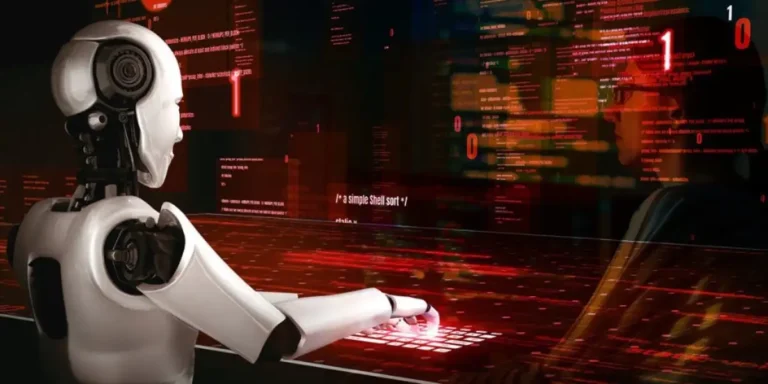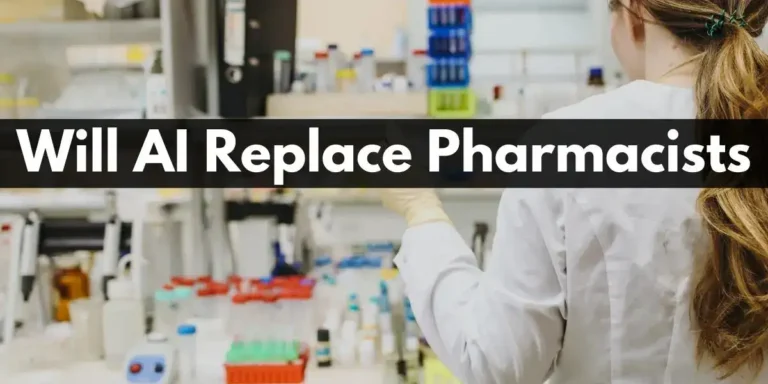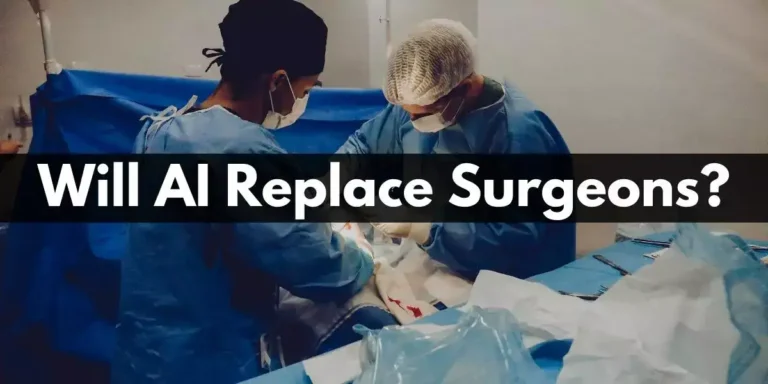Artificial intelligence (AI) is rapidly transforming the scientific landscape, allowing researchers to tackle complex problems and make breakthroughs at unprecedented rates.
However, as AI continues to advance, there are concerns about whether it could ultimately replace scientists altogether.
In this blog post, we will explore the potential impact of AI on the scientist’s job industry, education, and research sector, and examine whether it could truly replace human scientists in the near future. We’ll also explore the following criteria:
- Skills should develop as a scientist to stay relevant with AI.
- Initiative actions should take by Government.
- Potential Job losses due to AI.
- Some successful examples to integrate AI in the Scientists’ research sector.
- The role of scientists in an AI-driven future era.
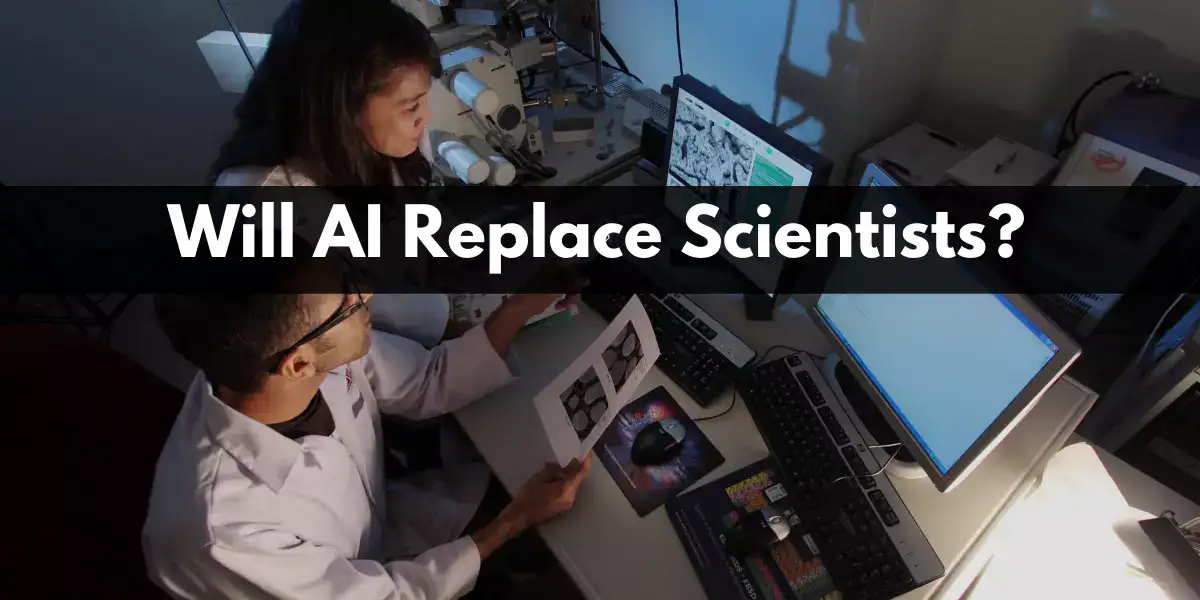
Will AI Replace Scientists?
No, AI cannot fully replace scientists. Although AI-based software and robots can become helpful assistants, scientists still possess the highest level of education and intelligence in society.
However, with further technological developments, AI may play an increasingly important role in supporting scientific research.
The Impact Of AI On Scientists’ Educations Sector, Research Sector, And Job Industry
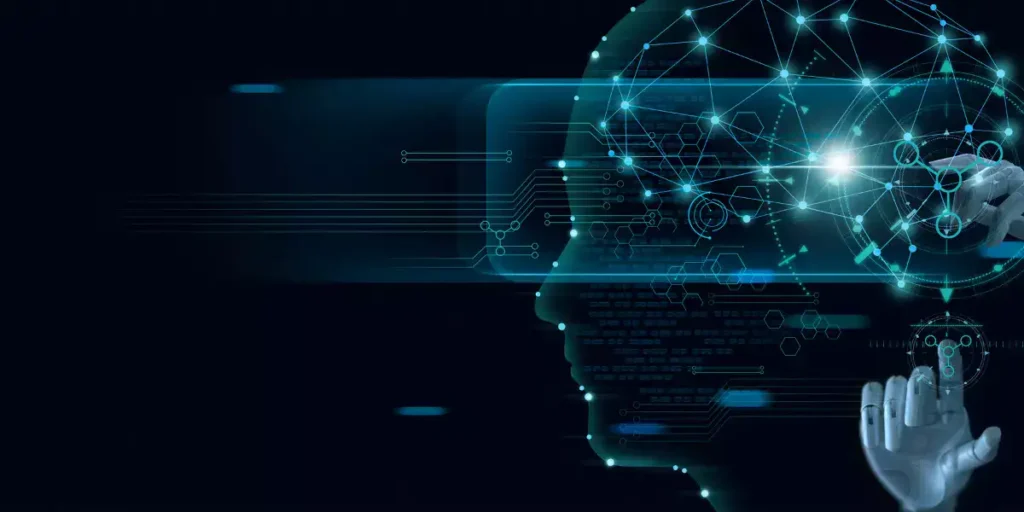
AI in the Education Sector
The Robotics science of AI has transformed the education sector in many ways. One significant change is the way students learn.
AI-powered tools such as virtual assistants, chatbots, and language translation have made learning more accessible and effective.
AI can personalize the learning experience to match a student’s needs and learning style, making education more inclusive.
It is also transformed the way educators teach. With AI-powered tools, educators can automate routine tasks such as grading and data entry, freeing up more time for instruction and research.
Additionally, AI can analyze student data to provide insights into areas where students need additional support and create personalized learning plans.
Here are some of the ways AI is affecting the education sector:
Personalized Learning:
AI-powered educational software can personalize the learning experience for each student.
The software uses algorithms to analyze data on each student’s learning patterns, preferences, and performance to suggest personalized study plans, and practice exercises, and provide feedback to improve the student’s understanding of the subject.
Personalized learning is particularly effective in addressing the diverse needs of students.
By providing individualized instruction, students can learn at their own pace, with greater engagement and improved outcomes.
AI-powered personalized learning platforms like DreamBox and Knewton provide adaptive instruction, allowing students to progress through content tailored to their level and learning style.
Intelligent Tutoring Systems:
Intelligent Tutoring Systems (ITS) use AI to provide feedback to students, assess their understanding of the subject, and provide guidance on how to improve.
These systems use natural language processing and machine learning to understand students’ responses, analyze their strengths and weaknesses, and provide real-time feedback.
ITSs are particularly useful in subjects like mathematics, where personalized instruction can improve student performance.
Carnegie Learning’s MATHia system provides personalized learning paths for students, helping them master math skills at their own pace.
Similarly, ALEKS uses AI to provide individualized instruction in math and science subjects.
Predictive Analytics:
AI algorithms can analyze data on students’ performance and behavior to predict their future performance.
Predictive analytics in education can identify at-risk students, predict their likelihood of dropping out, and provide personalized interventions to improve student outcomes.
Predictive analytics platforms like BrightBytes use data mining techniques to analyze student data, identifying trends and patterns that help teachers identify students who need extra support.
Similarly, IBM’s Watson Analytics for Education helps teachers predict student outcomes, improve retention, and personalize instruction.
Automated Grading:
AI-powered software can grade essays, assignments, and exams, saving teachers time and reducing the subjectivity of grading.
These platforms use natural language processing and machine learning to evaluate student responses, providing accurate and objective grading.
Automated grading platforms like Turnitin and Gradescope can grade essays and assignments, providing feedback on grammar, style, and plagiarism.
Similarly, AI-powered grading systems like EdX and Coursera can grade online quizzes and exams, providing instant feedback to students and saving instructors valuable time.
The Research Sector and AI
The field of study has undergone a transformation thanks to AI. AI-powered tools that can analyze massive datasets, run simulations and make predictions are now available to researchers.
These technologies assist researchers in processing and analyzing data more quickly and precisely, which results in novel insights and inventions.
Additionally, AI has facilitated more effective medicine and material development by researchers.
AI can assist researchers to find the finest substances and medications for certain applications by simulating various situations, saving them time and money.
Here are a few ways AI is influencing the research industry:
Data Evaluation
Research needs to analyze data, and AI has made this process much more efficient. Large datasets may be analyzed by AI algorithms to find patterns, connections, and insights that people would overlook.
For instance, Google-owned DeepMind has used AI to find novel medication targets for conditions like cancer and Alzheimer’s.
Scientists may create new medications to target these proteins by using DeepMind’s AlphaFold algorithm to anticipate the shapes of proteins.
Modeling and Simulation:
Scientists can anticipate the results of studies and create new experiments more effectively by using AI to simulate complicated systems and understand their behavior.
AI is used, for instance, in high-energy physics studies to model particle interactions.
This aids physicists in forecasting experiment results and understanding the behavior of these particles.
Before novel compounds are manufactured, AI in the area of chemistry may be used to forecast their characteristics, saving time and money.
Imaginative Laboratories:
Labs driven by AI are revolutionizing how tests are run and assessed. Because these laboratories can automate studies, performing research takes less time and money.
For instance, the Intelligent Lab at the University of Liverpool employs robots to carry out experiments and evaluate data.
Since they can operate continuously, the robots can do tests more quickly and with greater precision.
Additionally, laboratories driven by AI assist to lower the possibility of human mistakes, ensuring that investigations are carried out consistently and dependably.
AI in the Job Sector
In the fields of education and research, AI has produced several new work prospects. For instance, as businesses look to create new AI-powered tools and services, engineers and developers in the field are in great demand.
Additionally, the research industry, where big datasets are handled and examined, requires the expertise of data scientists and analysts.
With certain jobs now being automated, AI has also had an influence on work positions.
However, this has created new employment possibilities in fields like AI upkeep and repair.
As examples of how AI is transforming the scientific workforce, consider the following:
Drug Development:
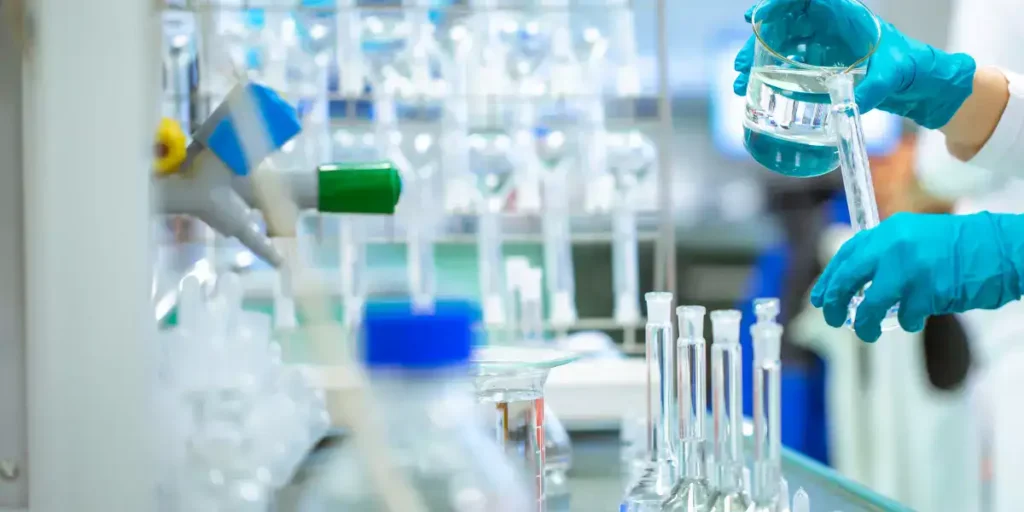
By evaluating enormous volumes of data on chemical structures and forecasting the effectiveness of new medications, AI has the potential to accelerate the drug development process.
For instance, Atomwise is a business that uses AI to find possible treatments for illnesses like Multiple Sclerosis and Ebola.
Their method finds substances that may bind to a therapeutic target by analyzing its chemical structure.
Scientists may concentrate on further developing interesting chemicals because of the enormous time and resource savings provided by this technique.
Analysis of research-related data
It has become difficult for scientists to examine, interpret, and make sense of the ever-growing quantity of data accessible.
AI algorithms may aid scientists in making wiser judgments and enhancing their comprehension of complex systems.
In the fields of genomics, proteomics, and neuroscience, for instance, AI-powered systems can analyze vast volumes of data to find patterns, insights, and abnormalities.
Scientists may design more successful tests and make better conclusions with the aid of these revelations.
Assisted Robotic Surgery:
AI-powered robots may help surgeons complete difficult operations, lowering the chance of human mistakes and increasing patient outcomes. Robot-assisted surgery is a fast-expanding profession.
The robots evaluate medical pictures using machine learning algorithms to direct the surgeon’s moves during the procedure.
A robot-assisted surgical system like the da Vinci Surgical System, for instance, employs AI to carry out minimally invasive treatments like prostatectomies and hysterectomies.
Patients may have shorter recovery periods and fewer problems as a consequence of the system’s high degree of precision and accuracy.
10 Ways for Scientists to Develop and Improve Their Skills To Stay Relevant In The Age Of AI

Participate in a Course or Workshop
Participating in a course or workshop, whether local or online, can be a great way to learn new skills and stay up-to-date with the latest developments in your field.
Many organizations, such as the NIH Office of Intramural Training and Education and the Khan Academy, offer free seminars and workshops online.
These can provide an opportunity to learn from experts and engage with peers.
Expand Your Thinking Around Research
Scientists should base their courses even more on the latest scientific research to clearly distinguish their executive education programs from less academic offerings.
Staying up-to-date with the latest research in your field is crucial for success as a scientist.
By understanding the latest developments and trends, you can identify new research opportunities and stay ahead of the competition.
Hone Your “People Skills”
While technical skills are important, scientists also need to develop their “people skills.” This includes critical and innovative thinking, collaborating skills, social skills, empathy, and adaptability.
These skills are outside the purview of rigid algorithms and are necessary for successful collaboration and leadership.
Stay Up-to-Date with Demographic Changes
As we live longer, the landscape of the workforce is changing. The world’s population is projected to reach 9.9 billion in 2050, with about 21% (2.1 billion) over 60 years old.
Scientists need to stay up-to-date with the latest research, trends, and developments in their field of work to adapt to these demographic changes and continue to innovate.
Focus on Developing Soft Skills
Soft skills like self-control, awareness, and flexibility are crucial for success in any field, including science.
Scientists can encourage the development of these skills in their teams as well as in themselves.
By fostering a culture of personal growth and development, scientists can enhance their teams’ effectiveness and productivity.
Enhance Communication Skills
As science becomes increasingly interdisciplinary, professionals in this field must be able to communicate complex topics to lay audiences.
In the biotechnology field, these audiences may include business leaders, regulatory experts, and the public.
Scientists must be able to distill complex concepts into easily understood ideas to effectively communicate their findings.
Keep Updating Your Skills
The pace of change in jobs and skills means there’s a growing demand to update skills.
According to a new report on workforce reskilling by the World Economic Forum, one in four adults reported a mismatch between the skills they have and the skills they need for their current job.
Develop Creativity
Robots and machines can do many things, but they struggle to compete with humans when it comes to creativity.
Therefore, scientists should focus on developing their creativity to stay relevant in the age of AI.
By encouraging creative thinking and experimentation, scientists can discover new approaches and solutions to problems.
Enhance Observation Skills
Observation skills refer to the ability to correctly observe both large-scale events and small details.
Most scientists’ hypotheses are based on observation, making this a highly relevant skill. Scientists must improve their ability to draw conclusions when observing various phenomena specific to their field of expertise.
Teach science skills to students
Scientists can also prepare for the age of AI by teaching science skills to students. By using the scientific method, students can develop their observation, hypothesis-making, testing, and conclusion-drawing skills, which are all critical for scientific success.
Sharing knowledge and expertise with the next generation of scientists is essential for the continued advancement of the field.
What Is The Role Of Governments And Organizations In Regulating AI In Science?

Setting AI Development Standards
Setting guidelines for AI development is one of the main functions of organizations and governments in terms of controlling AI in research.
The ethical ideals and concepts that ought to direct the development of AI are outlined in these standards, which provide rules and restrictions for researchers and developers.
For instance, the General Data Protection Regulation (GDPR) of the European Union lays out precise guidelines and restrictions for the gathering, handling, and storage of personal data, including data used for AI.
Accountability and transparency are ensured
Accountability and transparency in AI research and use must be ensured by governments and organizations.
This involves ensuring that AI systems are impartial and fair as well as that users and creators are held accountable for their activities.
For instance, the Algorithmic Accountability Act mandates that businesses do impact analyses of their AI systems to make sure they are neither prejudiced nor discriminatory.
Keeping information private and secure
AI systems often gather and handle personal data, which raises serious privacy and security issues.
To safeguard personal information and guarantee that AI systems are safe from cyberattacks, governments, and other organizations must develop rules and laws.
For instance, the General Data Protection Regulation (GDPR) in the European Union requires businesses to seek consumers’ express agreement before collecting and using their personal information.
Considering AI’s Implications for Ethics
The emergence of AI poses moral questions about how it will affect society, especially in light of possible job losses, biases in decision-making, and the consolidation of power in the hands of a select few.
Governments and organizations need to address these moral issues and make sure that the advancement of AI is consistent with social values and norms.
For instance, a group of AI researchers and business pioneers formed the Asilomar AI Principles, which describe ethical standards for AI development.
fostering global collaboration and cooperation
Since AI is a global phenomenon, worldwide cooperation and collaboration are necessary for its development and implementation.
To set uniform rules and directives for AI development and guarantee that AI complies with universal values and principles, governments and organizations must cooperate.
For instance, the Global Pulse project of the United Nations brings together worldwide partners to create standards for the ethical use of AI in the context of sustainable development.
Examples Of Successful Integration Of AI In Scientific Research
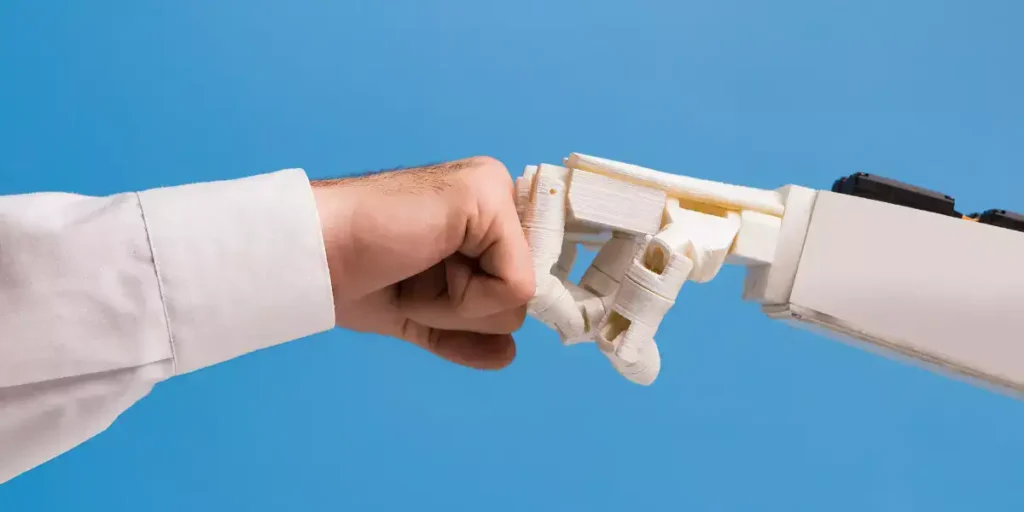
Cancer Screening and Diagnosis:
One area where AI is making a significant impact is cancer screening and diagnosis.
Researchers are using AI-powered deep learning algorithms to analyze medical images, such as mammograms and CT scans, to identify early signs of cancer.
AI can detect subtle changes in images that are often missed by human eyes, allowing for earlier detection and potentially better outcomes.
Protein structure prediction:
AI is also being used to predict the structures of complex proteins, which is critical for developing new drugs and understanding the underlying mechanisms of disease.
By analyzing large amounts of data, AI algorithms can predict the different shapes that protein structures can take and how they might affect the human body.
This allows researchers to gain a deeper understanding of disease development and to develop more effective treatments.
Drug discovery:
AI is being used to speed up the process of drug discovery by analyzing vast amounts of data to identify potential drug targets and predict the efficacy of different compounds.
This can save years of research and billions of dollars in drug development costs.
AI algorithms can analyze large datasets, such as genetic data and clinical trial data, to identify potential drug targets and predict how drugs might interact with these targets.
Biological research:
AI is also revolutionizing biological research by improving our capacity to study complex biological systems.
By analyzing large amounts of data from experiments, AI algorithms can identify patterns and make predictions that would be impossible for humans to do manually.
This can lead to new insights into biological processes and help researchers develop more effective treatments for diseases.
What Is The Role Of Scientists In An AI-Driven World?

The function of AI researchers:
The goal of AI scientists is to design and build AI systems that are capable of resolving challenging challenges in the real world.
A variety of real-world issues with vision, planning, reasoning, mobility, and natural language processing may now be resolved by AI algorithms working with huge data.
AI researchers must apply cutting-edge approaches to solve these challenging challenges since they operate at the nexus of science and technology.
The significance of AI researchers
And AI scientists are essential to the creation and use of AI systems. These researchers contribute to the ethical and responsible development of AI systems.
They are in charge of making sure AI systems are free of any biases that can provide discriminatory results.
AI researchers and education
Artificial intelligence systems are altering the educational landscape as they become more prevalent in daily life.
Artificial intelligence (AI) uses machine learning, natural language processing, and face recognition to digitize textbooks, identify plagiarism, and monitor students’ moods to determine which ones are struggling and which ones are bored.
AI will eventually adapt the educational experience to each student’s unique demands.
Future plans for AI researchers:
Future employment opportunities for AI scientists are anticipated to increase. Statistics show that from 2015 to 2017, there was a 190% growth in the number of LinkedIn profiles with AI expertise.
Leading businesses and institutions engaged in cutting-edge
AI research and development are helping to shape the future of AI, according to top AI researchers and executives including Andrew Ng, founder, and CEO of Landing AI and deeplearning.ai.
FAQs
Can AI Entirely Take The Position Of Scientists In All Scientific Fields?
No, AI cannot completely replace scientists in all areas of study since certain activities need originality, intuition, and the capacity to make decisions based on context and prior information, all of which AI lacks at the moment.
How Might AI Aid Scientists In The Search For New Drugs?
By screening millions of molecules and selecting the most promising ones for future testing, AI can aid scientists in the drug development process. AI may also be utilized to create brand-new molecules that are less harmful and more efficient.
Can AI Take The Position Of Scientists Working In Theoretical Physics?
No, AI cannot take the position of scientists in the area of theoretical physics since doing so would need creativity and the capacity to create novel theories and concepts, both of which AI lacks at the moment
In The Realm Of Genetics, Can AI Take The Role Of Scientists?
Because it needs a thorough grasp of genetics, biochemistry, and other related sciences, artificial intelligence (AI) cannot replace experts in the field of genetics. Although AI can evaluate genetic data and make predictions, it cannot take the place of a human geneticist’s knowledge.
What role does AI play in space exploration for scientists?
By examining data from space probes, finding prospective landing locations, and creating new missions, AI may assist scientists in space research.
AI may also be utilized to create more accurate universe models and discover novel occurrences that might be investigated by the next missions.
Conclusion
AI probably won’t be able to replace scientists completely.
Science is a difficult and subtle discipline that needs human skill and creativity, even while AI may undoubtedly improve their job and assist them in making quicker and more accurate conclusions.
Machines simply cannot mimic the distinct viewpoint and critical thinking abilities that scientists bring to the table.
Instead, we want to concentrate on methods to incorporate AI into scientific research to enhance efficiency.


